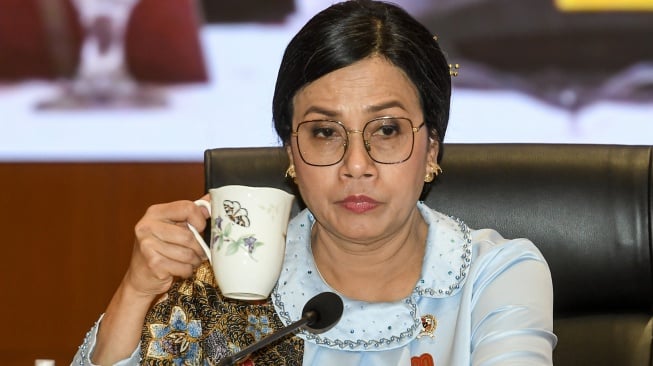A Political Earthquake At The Palace
Indonesia’s financial markets were jolted on September 8, 2025, after President Prabowo Subianto reshuffled his cabinet and replaced Finance Minister Sri Mulyani Indrawati. The move came as a shock to both domestic and international investors, who have long viewed Sri Mulyani as a symbol of fiscal discipline and credibility.
The announcement was made at the State Palace by State Secretary Prasetyo Hadi, confirming the dismissal of five ministers, including the finance minister. Other names reshuffled included the Coordinating Minister for Politics and Security, the Minister of Cooperatives, the Minister of Youth and Sports, and the Minister of Migrant Worker Protection.
Yet, it was Sri Mulyani’s departure that dominated headlines. A former World Bank managing director, she has been a central figure in Indonesia’s economic management for nearly two decades. Her presence in the cabinet was often interpreted by investors as a guarantee of fiscal prudence and macroeconomic stability.
Rumors quickly circulated regarding her next steps, with some suggesting she might move abroad, while others speculated she would remain in Jakarta. The palace offered no clarification on whether she was dismissed or resigned, deepening the sense of uncertainty.
Market Reaction To Sri Mulyani Resignation
The Jakarta Composite Index (IHSG) fell sharply following the reshuffle, losing 1.28 percent to close at 7,766, after earlier trading in positive territory. Analysts noted that investor sentiment deteriorated almost immediately after the announcement. Foreign investors recorded net sales of more than Rp 526 billion in a single day, underscoring their unease.
The sharp sell-off highlighted just how important Sri Mulyani was to the market. For many institutional investors, her policies represented continuity and discipline. She consistently advocated for cautious fiscal spending, tax reform, and sustainable debt management. Without her, the market fears a tilt toward looser fiscal policies under President Prabowo’s ambitious spending agenda.
Adding to investor anxiety was the fact that her replacement, Purbaya Yudhi Sadewa, was not widely expected. Market observers initially believed Deputy Finance Minister Thomas Djiwandono, a nephew of President Prabowo, would take the role. Instead, Purbaya, the former head of the Indonesian Deposit Insurance Corporation (LPS), was chosen.
While Purbaya has experience as an economist and policymaker, he does not carry the same international reputation or market credibility as his predecessor. His first public statements, which projected confidence in achieving 8 percent economic growth, failed to reassure investors.
Fiscal Policy Direction Under Purbaya
The central question now is how Indonesia’s fiscal policy will evolve under Purbaya’s leadership. Investors and analysts are closely monitoring whether he will continue the cautious approach of Sri Mulyani or align more aggressively with President Prabowo’s expansive spending agenda.
The new finance minister inherits a challenging fiscal environment. Indonesia’s state revenue remains under pressure, while public expectations for infrastructure, defense, and welfare spending are growing. The government has also faced rising social tensions, evident in the recent protests in Jakarta that unsettled the administration.
In his first remarks, Purbaya downplayed the significance of demonstrations, suggesting that higher economic growth would automatically resolve social discontent. This statement sparked criticism from economists who argue that sustainable growth requires not just fiscal expansion but also institutional trust and social inclusion.
The key concerns for investors include:
- Budget discipline: Whether the new minister will cap the fiscal deficit at sustainable levels.
- Tax policy: How the government will address revenue shortfalls without overburdening businesses.
- Debt management: Ensuring that public borrowing remains within manageable limits.
- Investor confidence: Restoring credibility after a sudden change in leadership.
The Legacy Of Sri Mulyani
Sri Mulyani’s legacy looms large over Indonesian policymaking. She was instrumental in steering the economy through the Asian Financial Crisis, the Global Financial Crisis, and the COVID-19 pandemic. Her reputation for integrity and fiscal discipline made her one of the most trusted figures in government, both domestically and abroad.
Her resignation, or dismissal, raises questions about the balance of power in Prabowo’s cabinet. Sri Mulyani had reportedly clashed with other ministers over fiscal priorities, with rumors suggesting she had previously offered to resign after being sidelined on major spending decisions.
The market’s reaction shows just how critical her role was. Without her, investors are unsure whether Indonesia can maintain the same level of discipline in managing its state budget and public debt.
Political Dynamics Behind The Reshuffle
Beyond economic implications, the reshuffle reveals much about the political calculus within Prabowo’s administration. Appointing Purbaya could be seen as an attempt to consolidate loyalty and ensure alignment with the president’s ambitious goals. However, it also risks alienating stakeholders who valued Sri Mulyani’s independence and professionalism.
This reshuffle was the second under Prabowo’s leadership. Earlier in February 2025, he had replaced the Minister of Higher Education, Science, and Technology. The decision to remove Sri Mulyani signals a bolder shift, one that could reshape Indonesia’s economic governance in the coming years.
Outlook For Indonesia’s Economy
Despite the turbulence, Indonesia’s economic fundamentals remain relatively strong. Domestic consumption continues to drive growth, while investments in infrastructure and digital technology provide long-term potential. However, the immediate concern is whether fiscal policy under Purbaya can maintain balance and credibility.
Markets will likely remain volatile in the short term as investors await clearer signals on budget policy, taxation, and debt management. Much depends on whether the new finance minister can quickly establish credibility with both domestic and international markets.
In the medium term, if Purbaya succeeds in demonstrating fiscal responsibility while also supporting growth, confidence could gradually return. However, failure to reassure markets could lead to capital outflows, a weaker rupiah, and higher borrowing costs.
For now, Sri Mulyani’s departure serves as a reminder of the delicate balance between politics and economics in Indonesia. Her resignation leaves a vacuum that will not be easily filled, and investors will continue to watch closely how the government navigates this transition.
Read More






 Saturday, 31-01-26
Saturday, 31-01-26







